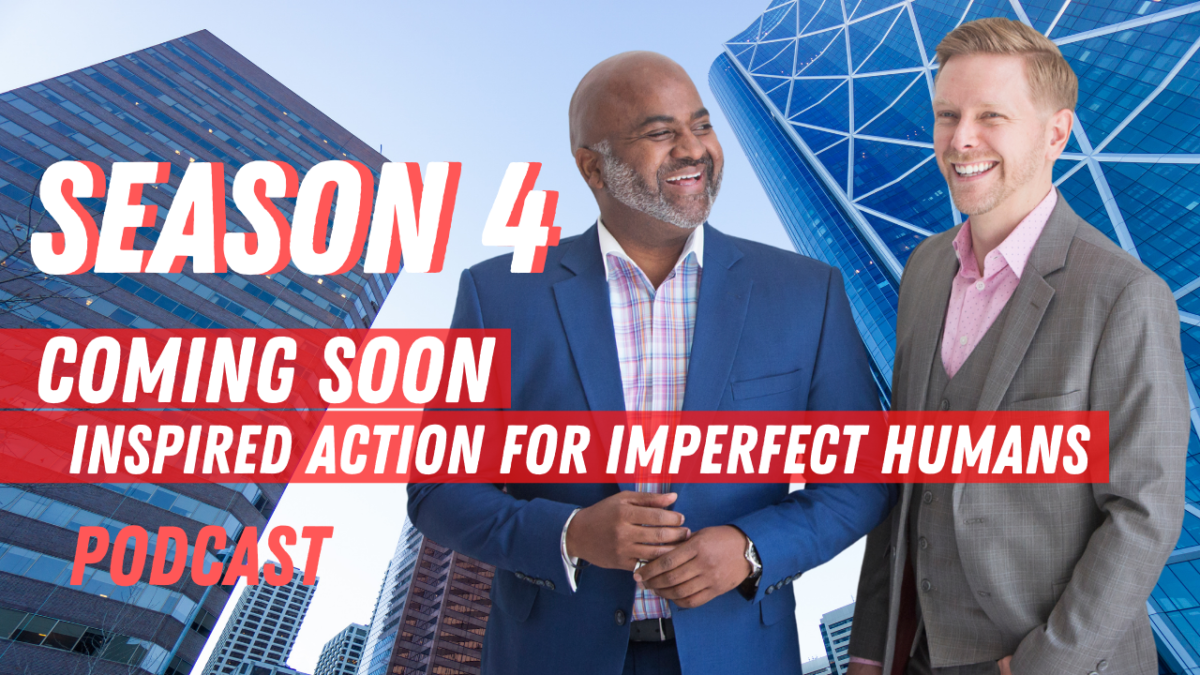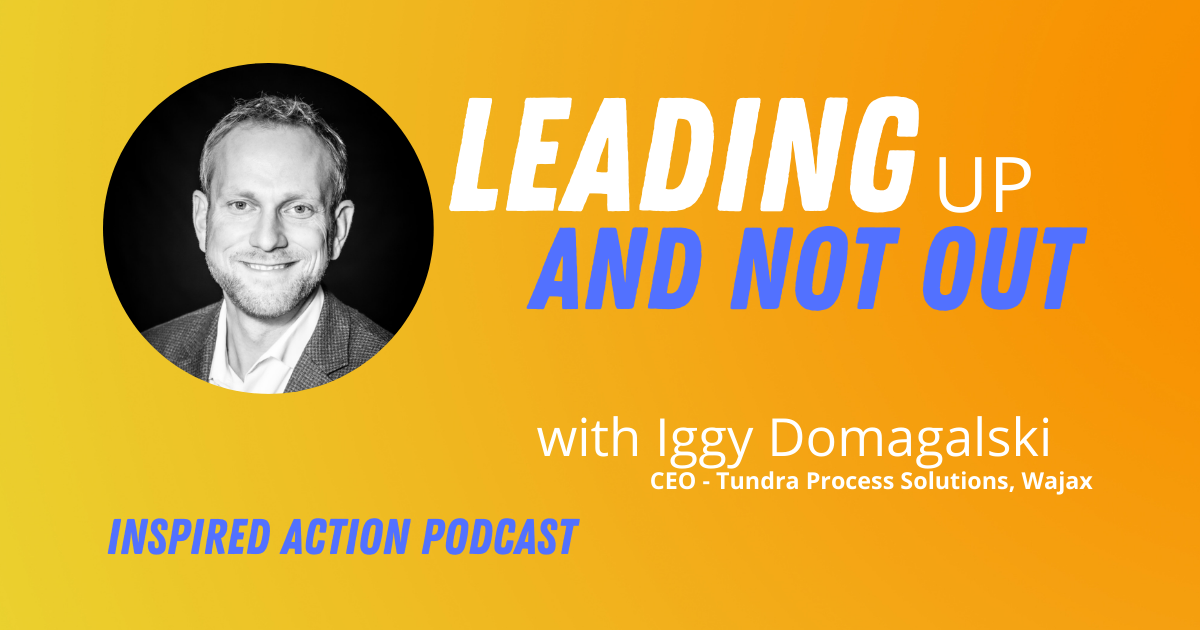“Leading Up and Not Out” Brief Summary:
Do you lead up and not out? Do you help you teams become the best they can be? In this Inspired Action For Imperfect Humans podcast episode, host Kyle Kalloo and CEO of Tundra Process Solutions and soon to be CEO of Wajax, Iggy Domagalski discuss leadership and how helping your teams to be the best they can be, can push your team members and leaders in your organization up, and not out!
“It’s about helping, the people that I work with to be really the absolute best that they can be. And I think when you, when I’ve figured that out, that’s when, you know, that that’s, that’s when, as a team, we started to experience more success because when everyone else was doing awesome. Then that just pushes the other leaders up, not out.”
Summary:
- Kyle introduces Iggy Domagalski
- Iggy talks about some of his key failures
- Leading up, not out.
- The silver lining in leadership.
- Why you should hire your replacement.
Guest Contact Info:
Wajax: https://www.wajax.com
Iggy Domagalski LinkedIn: https://www.linkedin.com/in/iggydomagalski/
Iggy Domagalski email: [email protected]
Calls to Action:
Even before the remote workforce evolution, office culture was inherently fragile. After all, it’s made up of imperfect humans interacting with other imperfect humans. And while perfection isn’t the goal, we all secretly wish for a workplace where people find ways to bring out the best in each other. Unfortunately, that’s not always an intuitive skill. It takes guidance, practice, and then more guidance and practice… but with the right leadership, it’s definitely achievable. How do you enhance your workforce’s ability to engage, collaborate, and adapt in this volatile and uncertain reality? Get the answers to your culture questions when you setup a complimentary Discovery Session with Kyle Kalloo at https://ChangeMyLifeCoaching.as.me/?appointmentType=14623413
Kyle Kalloo, ICF – PCC (Professional Certified Coach) and certified Master Coach (CTMC), to learn more on how he can help your organization create an engaged, collaborative, and adaptive culture.
Not loving your career? Feel you need a change in your job? Let’s Strategize! Book a complimentary Strategy Session with Christopher Lawrence here: https://ChangeMyLifeCoaching.as.me/?appointmentType=14044176
Tell us your “inspired stories” stories by visiting www.InspiredActionPodcast.ca
Christopher Lawrence LinkedIn: https://www.linkedin.com/in/career-life-coach-christopher-lawrence/
Kyle Kalloo LinkedIn: https://www.linkedin.com/in/kyle-kalloo/
Change My Life Coaching & Change My Business Coaching LinkedIn: https://www.linkedin.com/company/6446498/admin/
Looking to create a corporate coaching culture? Reach out to Kyle Kalloo: [email protected]
Website: https://strategicleader.ca
“Leading Up and Not Out” Transcript:
Folks folks, folks, it’s Christopher Lawrence here. We are coming near the end of season three, which was Kyle’s mini series with these leaders, this special project that we’ve been working on. And I really hope that you’ve enjoyed it as much as I have. I have kicked Kyle out of the room just for a minute.
He’s got one more interview for you today. And, uh, we’re going to get to that in a second, but I did want to let you know, uh, Kyle’s not here. I am taking this podcast. Wait, wait, wait, wait. Oh, I didn’t think you were here. I didn’t think you were here. You know, we couldn’t have that. We couldn’t have him hijack me like that.

I’m the one that’s still working while he was doing what he was doing, but I’m back and, uh, we have something so exciting to tell you about season four and we’re not going to tell them until next week, we’re going to tell you next week, folks, you have got your regular episode for season three coming up right now.
And Kyle, I will just leave them with these words, Kyle, you specifically wouldn’t know about good things because you are not a woman of integrity, intelligence, or energy. Thank you very much, folks. Enjoy this episode.
[00:00:00] And it’s about helping, uh, the people that I work with to be really the absolute best that they can be. And I think when you, when I’ve figured that out, that’s when, um, you know, that that’s, that’s when, as a team, we started to experience more success because when everyone else was. Doing awesome. Then that just pushes the other leaders up.
Are you experiencing lack of mentorship and might not want to ask because you don’t want to look incompetent is the thought of being imperfect, keeping you from taking action. Welcome to inspired action for imperfect humans. Season three, each week, we interview senior leaders to uncover the inner workings of being a strategic leader in how they curate a corporate coaching culture.
We debunk some common misconceptions by exploring their failures and successes as imperfect humans. This weekly [00:01:00] mentorship will help you with tactics to play the game, navigate the politics and think strategically from the heart of Calgary, Canada. Here’s your host. Award-winning coach Kyle Kalloo. Whoa, whoa.
Hello. Welcome to another exciting. Everyone. Thank you so much for joining us today. Now we’ve got a treat for you. We’ve got a treat for you. So before, um, we get him started. Let me just do a quick little intro just to tell you how after reading this guy’s bio. I thought to myself, I really had options. I really could have done something, uh, with my life, by the time I hit my age.
Uh, but anyway, let’s, let’s get right into it. So Iggy Domagalski. Iggy Domagalski, um, was most recently the CEO of the Tundra process solutions. Um, team here in Western Canadian, it’s a Western Canadian distributor of a diverse industrial process equipment, um, company side of it. Now, [00:02:00] earlier this year though, Tundra was purchased by Wajax a Canadian, publicly traded company and Iggy will become the CEO of Wajax in January of 2022. Um, like 2021 is already gone. This is crazy to me. Uh, prior to Tundra, Iggy started his career in finance at Investors Group and Richardson, GMP in Winnipeg, and later became the president of Western Industrial and air compressor manufacturer in Vancouver.
Iggy’s an avid. Community fundraiser and has served on the boards of a learning disability association, the international society of automation and the kids cancer care foundation, um, which I recently saw an event that they just did. Um, a couple months ago, Iggy holds a bachelor of commerce degree from the Asper school of business, where there is an award in his name that was created by his fellow students and has been given.
Annually since 2004, how come? No one’s ever gotten an award and my name on it. Anyway. He [00:03:00] has been named one of Canada’s top 40, under 40, and one of Canada’s 50 most inspirational entrepreneurs folks. We’ve got Iggy like this guy probably has no failures. Right. But we’ll find out, we’ll find out Iggy.
Welcome to the show. Did I miss anything? That was a very kind introduction. Thank you, Kyle, that, uh, summarizes about all of it, except all my failures, which I’m excited to talk about today. Perfect. Perfect. We’re going to get into that in a bit, but mate you’ve done some things? What was that like? Cause we know the road to all of that stuff came with.

You know, it’s been, uh, it’s been a pretty fun run. I’ve, uh, I’ve always really enjoyed what I’ve done for a living, which I think is kind of winning half the battle right there. Um, just actually enjoying your work and really being passionate about the industries that you’re at or the type of work that you’re doing makes coming to work a lot [00:04:00] easier.
And it almost doesn’t even seem like work. My, my wife would tell me that or would tell anyone that work is really my hobby. I like doing it. I like the people that I work with. And, uh, and so that, that makes it easy, but it has been a really, really fun run. I’ve worked with some awesome people. We’ve got lucky a couple of times along the way.
I got unlucky a couple of times along the way, and, uh, excited for the journey head forward with the Wajax as well. That’ll be a cool new chapter and a really exciting time, I think. No kidding. So I’m actually curious when, if you had to go back. When you thought of leadership, like, what were you thinking?
Like what, what did you think leadership was? Okay. Well, I mean, when, when I was young, it was probably pretty similar to what a lot of other people think it is. Right? It’s well, it’s managing people and I get to be the boss and those kinds of things. Uh, I’ve obviously I found out is, you know, that’s not it, but, [00:05:00] uh, but those are, those are the kind of grave misconceptions that I had as a young man.
It’s so interesting because we hear that, you know, and the reason why we wanted to really do the series is because, you know, I work with a lot of senior leaders and I think when you get to that point, people don’t realize. What it takes to get to that. I mean, they see, they think you could show up to work at 11 o’clock and you’re done by two o’clock, but they didn’t have no idea.
There is no clock, right? Like it’s just a constant thing. And so a lot of people often say, we just want to understand, like, what does a leader think? And you know, what are some of those things that happen? And so that’s kind of really why we wanted to do this. And so I like, and appreciate you say, listen for what I thought of.
To what it is, you know, although regardless if we kicked in scream, we enjoyed it. Right. It’s something paid off for us. Um, but sometimes it’s, it’s, it’s different. So if you could summarize maybe some key, either failures or takeaways from you in [00:06:00] your journey of leadership, like what has been the things that you would think that really stood out for you as you got to this level, which we know it still goes right.
But got to this level, Well, I think, you know, when you think about your old self, you know, and, and I think about, oh, what was I like 10 years ago? I think, oh man, like I was an idiot. And I’m sure when I think about myself today, 10 years from now, you know, hopefully I won’t think I’m that big of an idiot, but I’m sure I will have definitely evolved the way that I, that I think can deal with people and, and, and the way that I lead.

But so some of the things that. It’s been a long journey. And, but some of the things that I’ve learned is that, you know, it’s, it’s really not about me, right? It’s not about the leader. It’s about the team and it’s not about getting what I want. It’s about helping them get what they want. And it’s about helping, uh, the people that I work with to [00:07:00] be really the absolute best that they can be.
And I think when you, when I’ve figured that. That’s when, um, you know, that that’s, that’s when, as a team, we started to experience more success because when everyone else was doing awesome, then that, that just pushes the other leaders up, not out. And so that was, that was really important for me, just that it wasn’t about me.
It’s about them helping them become, uh, just, just the most awesome leader, uh, and the most awesome human that they can be. And when you’re able to do that, Make the workplace, a place such that they can be really happy and engaged and show up and give it their all. Then, then that’s when that’s when really the good things happened.
Um, that, that was one, that was one big thing that I, that I learned over the years. And, uh, another thing that I learned was that it [00:08:00] really doesn’t always have to be my way. Right. Like, and, and that there is, there is, there’s so many. Ways to arrive at a successful future that they don’t all have to be the, you know, the, the path that I choose to get there.
And maybe my path that maybe the way that I want to do it is a correct way, but it’s not the correct way. And so I, I found that when, you know, as long as people are generally aligned with where we’re going, kind of like 80% aligned to the vision and the, and the end game of where. How did they get there?
You know, as long as it’s ethically and, and in a kind humane way, uh, that it, that it really didn’t matter to me ultimately like it. And when, when the people that I work with chose how to get there, as opposed to doing exactly what I told them to, there was just a lot more buy-in and a lot more, a lot more passion for doing it because it was their way instead of my way.
[00:09:00] And so learning those couple of things, that was, uh, that was. Really great lessons along the way that really helped just make things easier. Yeah. Yeah. You know, I really liked what you said, you know, a couple of things about, you know, leading up, um, which, you know, if you do it right. I think there’s an opportunity that leadership, uh, gets let up versus out.
Right. Cause I think sometimes there’s that scarcity mentality. Right. Okay. You know, if I get them to lead themselves and create awesome, engaging, productive people, then maybe you won’t need me as the leader without realizing you’re the one who curated that nature that was possible. So I think those are great ways.
Um, and the second piece around, you know, making sure you recognize that, you know, if they get buy-in and, and enable to kind of create another solution for themselves, you know, it doesn’t always have to be. You know that we have to be on that. And, um, uh, you know, I like when you mentioned the piece around, make it ethical.
I, [00:10:00] what I used to say to my team is keep me out of jail. Like, I don’t want to go to jail. Like this was not my thing. So like, let’s make sure these things, cause that’s what happens, right? When the buck stops, where it stops is you’re ultimately, you know, accountable it looking back, you know, what would you say.
A, it may not be your number one failure, right? Because as you know, the path to get there is filled with a lot of different things, successes as well. It’s not all failing. Um, but if you had to identify one key failure that you thought, oh my God, like I really could have done without this lesson, maybe in my leadership, what would that be?
Which. Oh, Kyle, there are so many, there are, there is a road paved with, with hard lessons, but I guess everyone’s road is paved with hard lessons, but you know, a couple that stick out kind of like a, a behavioral failure that I think I had, uh, [00:11:00] earlier on. I, I really try not to do it as is the whole, my way or the highway attitude.

What I one. You just don’t get the best ideas. And my way often is not the right way or a less efficient way. So actually getting the super smart people around you to, to speak up, to do it their way is often actually a better way, but the more important, and the more crushing part of that was that, um, you really, if you shut it down hard once, like he kind of slapped somebody down and said, no, no, no, we’re doing it my way.
Yeah. Not only have you killed the opportunity that time to get there. Great idea. You’ve kind of killed it forever. Like there they’re not coming back. Like they’re not, unless there’s a very, very compelling reason for them to come back with a great idea. They’re just, they’re going to kind of defer back and say, no, no, you got this.
I, I don’t, I’m not getting slapped down like that again. And, uh, I’m not, I’m not doing that again. So I’m just going to do whatever you tell me to [00:12:00] do. And. And then you have to kind of like crack that back open and go in and rebuild that trust so that those ideas start floating in. And that’s a long process too.
So I’m not doing that in the first place would have been better, uh, rebuilding the trust as a second best and just letting it sit, which, you know, at some points in my career, I probably did. Uh, That I found was really destructive. Just, just permanently shutting down creativity from one of my teammates because of quick comment that I made.
And I think that’s one of the, one of the lessons that I’ve learned is. No, we’re all just, we’re all just people doing things and trying to make a living and work on our, with your life here. But there is weight that’s attached to the words of, of senior leaders in companies. And people just listen to them very carefully.
And if you say the wrong thing and you inadvertently shut someone down, Or, or, or on purpose, [00:13:00] they’re not going to come back to be in that creative, awesome person. You may have damaged something there sometimes even without knowing it, you know, and that’s, I think is the craziest part, right? Is when you don’t even know it, you just, you, until later on you see the innovation is down.
Creativity is down, you know, no, one’s putting their hand up by saying, Hey, here’s what I want to do. You know, sometimes I’ll say this to my clients who mean, and I think you could clarify this for me because you are actually a parent unlike me who pretend to be one, you know what I mean? Um, and what I’ve learned, you know, is that, you know, when they do it their way, and if they made the rice that looks green, they’ll eat it because they did it.
Right. Whereas you put all this work in. No, no, no. You not supposed to do that. No, no. You’re not supposed to that. And then you’re like, but look at this beautiful plate and like, now I don’t want it. And you’re like, really, you’re going to get your green rice, but there’s something about that. Buy-in when they create it.
Right. Am I off on that? Is that how parenting works? Like you tell me. Oh, you’re a, you’re nailing it. I got, I have a twin daughters who are 11, so they’re at a very special [00:14:00] age right now. And they’re, you know, they’re, they’re pushing boundaries and, uh, we haven’t seen green rice specifically, but there has been, there has been many variations of that exact thing in our household and yeah, for sure.
Uh, it’s a, it’s a thing. Yeah, I know. I really appreciate that because I think, you know, when you take a look at leading and when you want to get into that leadership, there’s times to be able to be humble, to recognize your way is not that your way is a perspective. And although you may be the one who may have to make the final decision, um, it doesn’t mean that you can’t take contribution from everyone.
So I appreciate you saying that. What’s a silver lining. So since you now said, listen, it’s not my own way only. Maybe it’s a contribution of that way. Um, but some of your failures, either this one or others, what has been the key silver lining you think, you know, that has kind of got you to where you are, that you’re still getting promoted.

I mean, these, these things are still happening, which just means more responsibility. That accountability that’s really. Yeah. Which [00:15:00] I like, I like responsibility and accountability, but, but you know, that. The big lesson from the, you know, from, from shutting down ideas was to realize that, not do that. And, um, you know, for, for better or for worse now, uh, at Tundra here, we built, uh, just, uh, a really, really open management team.
Uh, one that I think trusts each other implicitly. And, uh, so we all call each other out every. In meeting sometimes even on a town hall, I’ll get called out by some of our team. And, and I mean, I only have myself to blame for that, but, but I really like it. It means that for the most part, I think our people, uh, whether it’s our management team or the rest of the company are comfortable asking me hard questions.
Right, which is good because when they’re comfortable asking hard questions, then they’re comfortable presenting ideas. That might be a little bit crazy and they’re, and they’re comfortable really speaking up, um, about what they really think, as opposed to just kind of [00:16:00] bending to somebody else as well.
And that’s created it. That’s created a great team and, um, and you created some great leaders and, and. The thing about pushing people up, you know, leaders get pushed up and not out that’s, that’s kind of what happened. And I always told my management team, I said, you know, you guys, if I was hit by a bus, it would be fine.
And sure enough, they said, no, no, no, no, we need you. And sure enough, this opportunity at Wajax came up and, um, and the guy that took over for me, his name is Ash. Uh, he’s been at Tundra eightteen years. You know, it was seamless, seamless, like, like he got the keys and it was the transition lasted a day.
And, uh, you know, he’ll still call with a couple of questions every now and then just on a specific task. But, uh, the actual leadership transition, it was full and complete within 24 hours. And sure enough, I didn’t get hit by a bus thankfully, but it would’ve, it would’ve been, yeah. Fine. Uh, so having that, having that next person who can take over for you, that’s another big lesson is making sure [00:17:00] that you do hire your replacement at some point, because if you don’t have a replacement, you can never get promoted.
That’s the other thing. And I, and I don’t get how some people don’t see that because I’m just in, and the other thing too, is I often speak to my clients about if the entity, the company could speak. What would it say? Right. And I know it would not be okay. Having the risk of not having succession plan. Right because, you know, heaven forbid, we, we sometimes say, what if you won the lottery versus the hit, find the bus, you know what I mean?
You want a lot of you kind of want to step out and do other things, you know, what does that look like? And I think sometimes this was what’s happening in an organization is we’re leaving the company at risk, right. By not having qualified people, but not mentoring them by not training them to be at that level.
Right. And so. What would you say is the current challenge right now for your team? And I know you’re transitioning from existing, but what maybe was a challenge that you think they’re experiencing right now, or maybe you, you know, at Wajax, there’s, there’s going to be challenges. Like what would you say.[00:18:00]
Um, for the team at Tundra, uh, which, which is not me anymore, but, uh, I think there, I’m still involved with Tundra. Yeah. There, there Tundra is still, it’s still part of the Wajax group of companies. And so I’ll be involved with Tundra forever. Uh, and I’m. Right now I’m sitting in the Tundra office, which is where I will remain.
So I’ll still be close to the people here forever. But in terms of their actual challenge, I think is just change. Uh, you know, they have, they have a few leadership changes that they’re, uh, that they’re figuring out right now and all of them are good. And so it’s not, it’s not like leadership changes. Like, Hey, we’re laying off a third of the company.
It’s all good stuff. Um, but you know, Yeah, new people to get used to a new roles and that’s okay. So I think that’s their, that’s their challenge. And also, uh, figuring out how to navigate within a larger company. Uh, that’s a little bit new for some people here, although for the most part Wajax has really left, Tundra alone and will continue to do so.
Uh, for me personally, uh, You know, it’s, it’s all brand new to me. Right? [00:19:00] So, um, all the, all the people that will be kind of directly reporting to me in Wajax are all new to me. Uh, the entire company is new to me, so I have to learn everything. And, uh, that’s just new. And, uh, the, the biggest change I think for me personally, will, will be stakeholders.
So at Tundra I had. One boss. He was the chairman of our company. That’s who I reported to. And that was the stakeholder. And now I have a, there’s a chair of the board who I report to, but a whole board as well. So there’s nine different personalities on there that I need to know. Uh, there are there’s, there’s a whole group of investors that I’ve.
Yeah. Uh, the manufacturers have a little bit more power, uh, and just because they’re larger. So getting to know them and understanding what they want there’s analysts to deal with and banks that have strong relationships. So, um, so there’s just a lot more stakeholders that I need to manage, which is something I’m looking forward to learning about, but it’s, uh, but it’s yeah, it’s for sure.

Uh, that’s that’s my next leadership challenge. Yeah. Yeah. [00:20:00] Lots of moving pieces on that. And I say to people all the time, everyone has someone to report to you, right? Even at the top of the top, if it’s not a board, even a board, you report to the end result. Right. Cause then it could circle back to the client, the customer side of it.
Everyone has someone. So this thing, this notion, this misconception that, you know, someone glides as a CEO, right? It’s like, oh, we’re good. There’s no one else. No, there is a group, right. Uh, that comes with that. So in closing, what would be one thing I think. If you had an opportunity to tell your younger self before, you know, he became top 40 and 40 top 50, you know, 2004 named award, like what would you tell your younger self?
If you could go back and say, Hey, No. I, I think some of those lessons that we talked about earlier has, uh, you know, that it, it doesn’t have to be your way. Right. And, uh, and, and make sure to, to really make it about, about your team and about the [00:21:00] people around you. And it’s, it’s not for you, it’s for them.
And if you do what’s right for them, what’s right. For, you will just kind of naturally happen. I think, I think if I would have learned. Even sooner that would have been better. I’m happy that I learned it at all. Um, so I’m, I’m fortunate and I feel fortunate for that, but I, I think there would be, it would be around some of that and 10 years from now, the answer might be different.
I’m sure I’ll learn some more lessons over the next decade that I’ll wish I would have told myself today about. I love that. Thank you so much. I really appreciate it. You know, some of the things that we really chatted about, you know, that piece that really resonated with me as well. It’s just that whole, you know, managing, you know, That doing effective leadership can be about leading up versus, you know, leading out right.
And so there’s no need for that type of scarcity. Um, and knowing that it’s really about how do you ensure that type of creativity is there and knowing that, you know, your way is not the only way. We’re not saying you shouldn’t have a way, but we’re saying it’s not the only way, because it’s really important to have that.
Buy-in when you think [00:22:00] about, you know, how you contribute on the team, because you know, if people are not buying in, like you alluded to. There may be some opportunities to rebuild trust. Right. Which sometimes I think is scary is when you don’t even know what’s happening. Right. As I sometimes I think people gravitate to the squeaky wheel and you’re like, yeah, at least the squeaky wheel is telling you, it’s the ones who disengaged and checked out that you have no idea.
So, um, did I miss anything in that summary? Anything else that you want? Yeah. That’s perfect. Brilliant, brilliant. You. Thank you so much for joining and for those folks who are listened to for the first time, I hope you got something out of this. If you’ve not done so already, please share. Download, subscribe.
If you’re not talking to this with your other people or leadership, what the heck are you doing? You need to be able to do that. And for those who may be struggling in their own leadership or looking for some practical solutions, you can always reach out, uh, to myself. Um, in the show notes, we’ll have, uh, information in there as well as mine.
I’m looking forward to seeing you next week.[00:23:00]



